Lakehead law school students are heading to Canada’s national trial advocacy competition after winning the Arnup Cup in Toronto earlier this month.

Lakehead law school students are heading to Canada’s national trial advocacy competition after winning the Arnup Cup in Toronto earlier this month.
This is the first time the Bora Laskin Faculty of Law has won the mock-trial competition. Third-year students Amanda Gallo and Nathan Wainwright, joined by alternates Phaedra Olinyk and Austin Nix, out-performed competitors from all law schools in Ontario, earning their ticket to the Sopinka Cup in Ottawa this March.
“It was a really great experience, a really positive one,” Gallo says. “I think that any time you have the opportunity to participate in an exercise that's so practical, really getting out there, running a full-length trial from start to finish where you're dealing with witnesses, real judges and real jurors, it's something that's really beneficial.”
The students from Lakehead acted as the defence counsel in a case involving the armed robbery of a convenience store. The accused and his girlfriend, eyewitnesses for the defence, and the Crown witnesses each alleged the other party had committed the crime resulting in, Gallo says, a case of testimony between the witnesses, a credibility contest in which the main issue was identity.
Gallo and Wainwright, the other oralist on the team, aimed to establish the accused had been set up by the Crown witnesses.
“The real crux of the case was that the key crown witnesses had given their statements to police saying that it was the accused who did it," Wainwright says, "but on a private wiretap conversation, they essentially admitted to wanting and plotting to set up the accused for the very crime that they alleged he had committed."
Gallo says extensive practice with Olinyk and Nix acting as Crown counsel helped them prepare for the actual competition.
“We were very fortunate to have not just our coaches but other lawyers in the community come and act as judges, to have other students from our school come in and participate as witnesses,” Gallo says. “A lot of credit really needs to go to Phaedra and Austin, because every time we ran that trial, it was something a little bit different. If it weren't for them, I don't know that we'd be anywhere near as well prepared as we were.”
Kimberley Gagan, founding director of Lakehead University’s Community Legal Services, together with Joanna Goldenberg, acted as the team’s coach.
Gagan says the mooting competition was a great opportunity for the school to showcase the skills of its students and the success of its program. She says Lakehead’s practical approach to the typical law school curriculum gives its students an edge in this kind of competition.
“Our program has integrated practice curriculum exercises built into the different courses, so [students] have a lot more hands-on, practical experiences than you would get in a traditional law school,” Gagan says. “I think that puts our students at an advantage in this kind of a practical competition.”
Wainwright says that, although the faculty of law has experienced some “administrative growing pains,” he is proud the team has been able to prove, at least through the mooting process, that Lakehead University is producing high-quality graduates.
“The reality of going to a smaller school is that the student body can develop a bit of a complex, in that they feel a touch inadequate in comparison to the more established law schools’ students,” Wainwright says. “I hope it provides some comfort to Lakehead students that just because we are in a northern Ontarian city and just because we have a smaller faculty and a smaller student body doesn't mean we are lesser than any other.”










